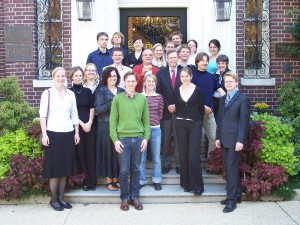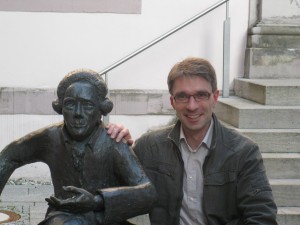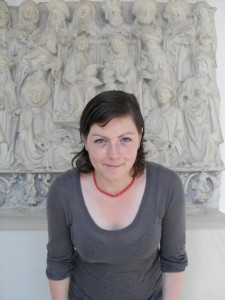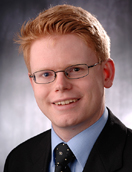Georg-August-Universität Göttingen: 3rd Reunion of the 5th Medieval History Seminar, August 5 to 8, 2010.
Monthly Archive for September, 2010
Humboldt-Universität zu Berlin: 1st Reunion of the 5th Medieval History Seminar, June 13 to 15, 2008.
German Historical Institute, Washington D.C.: 5th Medieval History Seminar, October 11 to 14, 2007.
»»» Conference report by Carola Dietze
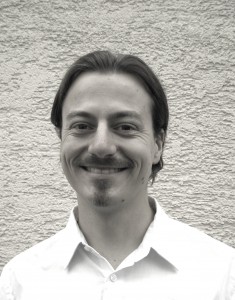 – Studies in Medieval History, English Literature and Political Science at Eberhard-Karls-Universität Tübingen and Nottingham University, M. A. 2006.
– Studies in Medieval History, English Literature and Political Science at Eberhard-Karls-Universität Tübingen and Nottingham University, M. A. 2006.
– 2006 to 2010: Ph.D. Thesis, examining long-term petty warfare waged by a network of noblemen around the Swabian knight Hans von Rechberg as an aristocratic strategy to maintain political autonomy in the face of territorial expansion by princes and cities in fifteenth-century Germany. Title: Adelige Netzwerke um Hans von Rechberg (ca. 1410-1464): Fehdeführung als adelige Überlebensstrategie im Kontext der südwestdeutschen Territorienbildung. Supervisor: Prof. Dr. Ellen Widder. Scholarships: Landesgraduiertenförderung Baden-Württemberg (Graduate Scholarship Programme of the State of Baden-Württemberg); DAAD.
Baden-Württemberg History Award 2013.
Published as: Aller Welt Feind. Fehdenetzwerke um Hans von Rechberg († 1464) im Kontext der südwestdeutschen Territorienbildung. Veröffentlichungen der Kommission für geschichtliche Landeskunde in Baden-Württemberg, Reihe B: Forschungen, 194. Band. Stuttgart: Kohlhammer, 2014.
Shirin Fozi is Mellon Postdoctoral Fellow in Medieval Art at Northwestern University (2010-12). Her dissertation (Harvard University, 2010) addressed the rise of figural tomb effigies in the Holy Roman Empire during the late eleventh and twelfth centuries, arguing that early sculptural effigies present a genre that is distinct in both form and function from its Gothic counterparts.
Shirin is currently working on two additional projects: an exhibition titled “Cross References” (Dumbarton Oaks Museum, March-July 2011), and an edited volume of essays titled “Striking Images: Christ on the Cross and the Emergence of Medieval Monumental Sculpture” (co-edited with Gerhard Lutz and Marietta Cambareri, expected 2011).
General information
- born 1981 in Bochum
- studied History, Philosohy and German Language and Literature (B.A. 2004/05, M.A. 2005/06) at Bochum University
- 2007 doctorat in Medieval and Modern History at Mannheim University
Professional experience
- March 2005 – June 2008 graduate assistant at Bochum University, Didactics of History
- winter term 2005/06 – 2007/08 assistant lecturer at Bochum University
- winter term 2007/08 visiting lecturer at Koblenz-Landau University
- August 2008 – March 2009 research assistant at Vechta University
- winter term 2008/09 visiting lecturer at Leuphana University Lüneburg
- since April 2009 assistent professor (Akademischer Rat) for Medieval and Early Modern History at Bielefeld University
- spring term 2010 visting professor for Medieval History at Mannheim University
Awards
- RUBeL eLearning Award 2008
- Award for the Communication of Sciences and Humanities of the Salzburger Hochschulwochen 2008
Fellowships
- June 2005 scholarship of the German Academic Exchange Service for Opole, Poland
- October – December 2006 doctoral scholarship at the Herzog-August-Bibliothek (Wolfenbüttel, Findel-Stiftung)
- Juli 2007 Medieval History Seminar, German Historical Institute Washington
- April – June 2008 Fellow for Intellectual History/ History of Ideas (Zeitschrift für Ideengeschichte, Gerda-Henkel-Stiftung)
- July 2008 master class „Construction and Boundaries“ with John R. Searle, Fredrik Barth und Thomas Luckmann (Exzellenzcluster Konstanz University)
- September 2008 visiting scholarship of the German Historical Institute London
- October 2008 stipendiary of the Studi storici italo-germanici, Trento („Perdono, grazia, giustizia. Figure della clemenza fra tardo medioevo ed età contemporanea”)
- since October 2009/10 non-resident scholar at the Max-Weber-Kolleg (Erfurt)
- since 2009 member of the Young Scholars Network at the Center for Interdisciplinary Studies (ZiF) Bielefeld
- February 2010 Karl Ferdinand Werner-Fellow at the Institut Historique Allemand Paris
- September & October 2010 Fellow at the International Gender Forum, Tübingen University
Miscellaneous
- summer 2006 research project „Nachlass Christian Ulrich Grupen (1692-1767)“ (RWLE-Möller-Stiftung, Celle)
- 2007 and 2009 assistant for the commitee of the Geschichtswettbewerbs des Bundespräsidenten (Körber-Stiftung, Hamburg)
- spring 2007 documentary project „Alte und kostbare Drucke“ der Stadtbibliothek Duisburg (Bürgerverein Duisburg e.V.)
- since 2008 associated with the International Medieval Bibliography (Institute for Medieval Studies, University of Leeds) for „Legal History“
Matthias Heiduk – born in the year Led Zeppelin’s “Physical Graffiti” appeared – studied History, Archeology, and European Ethnology at the universities of Würzburg and Freiburg, Germany. After obtaining the Master’s degree and working in archives, museums, and at the Department for Medieval History in Freiburg for several years, he gained the doctoral degree in 2008 with the study “Offene Geheimnisse – Hermetische Texte und verborgenes Wissen in der mittelalterlichen Rezeption von Augustinus bis Albertus Magnus”. Since 2009 he is assisting Frank Rexroth at the Department for Medieval History at the University of Göttingen. His main fields of research are the history of knowledge, of ideas, of imaginations, and of myths, the history of intercultural contacts, the cultural history of the occult, and the history of the Knights Templar. For further information about publications and papers please visit: http://uni-freiburg.academia.edu/MatthiasHeiduk
Born 1978. 1997-2004: Studies in History and English at the Georg-August University of Göttingen. 1999-2000: Assistant Teacher in Great Britain. June 2004: First State Exam for Secondary Schools.
April 2005-July 2008: Scholarship of the International Max Planck Research School at the Max Planck Institute for History, Göttingen. September-December 2006: Scholarship of the German Historical Institute London. August-September 2008: Scholarship of the Graduate School of Humanities, Göttingen. Since October 2008: researcher and lecturer (wissenschaftliche Mitarbeiterin) of Prof. Dr. Frank Rexroth, Göttingen.
Doctoral thesis: “Shame – Disgrace – Embarassment. The Social Function of Shame in Late Medieval England.”, supervised by Prof. Dr. Frank Rexroth.
Sita Steckel received her doctorate in medieval history in 2006 from LMU Munich. Her first book, on cultures of teaching and religious expertise in Western Europe c. 800–1150, will appear in 2010 (Kulturen des Lehrens im Früh- und Hochmittelalter). She worked as a researcher/lecturer (Wissenschaftliche Mitarbeiterin) with Professor Martin Kintzinger at the University of Muenster in 2004-2008.
Since 2008 she has been a research fellow at the interdisciplinary Exzellenzcluster “Religion and Politics in Pre-Modern and Modern Cultures” at Muenster. She is spending the academic year 2010/11 as a postdoctoral fellow at Harvard University’s Humanities Center.
Her current project is a study of ecclesiastical conflict culture, focusing on the political, religious, and intellectual clashes between the secular clergy and the Franciscan and Dominican orders in thirteenth- and fourteenth-century France, not least in the social microcosm of the medieval university of Paris. Perspectives and questions connected to this research project concern the interrelation of legal and religious argumentation in the medieval period, the role of conflicts as catalysts for long-term developments, and problems of the modern historiography with its conflicting master narratives of secularization and religious radicalization in the Western Middle Ages.
»»» Sita Steckel (Website)
Born 1979 in Rinteln (Lower Saxony, Germany). 1999 to 2004 studies in Medieval and Modern History, Scandinavian languages and Northern Archaeology at the University of Kiel. 2002 to 2004 scholarship from Studienstiftung des Deutschen Volkes.
8 December 2004 Master’s degree from the University of Kiel (Master thesis “The account book of the printmaster Peter Drach of Speyer (c. 1450-1504)”).
28 January 2008 PhD from the University of Kiel (Dissertation “Imperial coinage in the later Middle Ages”).
2001 research assistant with the Residenzen-Kommission der Akademie der Wissenschaften in Göttingen. 2002 to 2005 research assistant with the Professur für Wirtschafts- und Sozialgeschichte (Professor Dr. Gerhard Fouquet). April to June 2005 deputizing Assistant Keeper at Den kongelige Mønt- og Medaillesamling, National Museum, Copenhagen (Denmark). February 2006 to August 2008 Instructor (since April 2008 Assistant Professor) with the Professur für Wirtschafts- und Sozialgeschichte (Professor Dr. Gerhard Fouquet) of the University of Kiel. Since September 2008 Keeper of the Uppsala University Coin Cabinet (Sweden).
»»» Hendrik Mäkeler (website)
